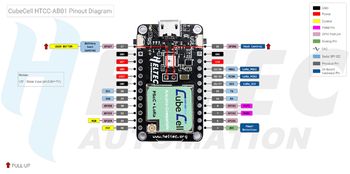CubeCell: Difference between revisions
| Line 27: | Line 27: | ||
* solar cell connection | * solar cell connection | ||
* [https://resource.heltec.cn/download/CubeCell/HTCC-AB01/HTCC-AB01_PinoutDiagram.pdf pinout] | * [https://resource.heltec.cn/download/CubeCell/HTCC-AB01/HTCC-AB01_PinoutDiagram.pdf pinout] | ||
According to https://heltec.org/project/htcc-ab01/ this board has only 16 kB RAM, | |||
so things might get a bit tight. | |||
A basic LoRaWAN "hello world" example with the basicmac stack uses approximately 2336 bytes. | |||
== Software == | == Software == | ||
Revision as of 14:40, 27 March 2022
| Project CubeCell | |
|---|---|

| |
| Low-power LoRaWAN Board | |
| Status | In progress |
| Contact | bertrik |
| Last Update | 2022-03-27 |
Intro
This page is about the CubeCell board from heltec.org, aka HTCC-AB01
the github page for the Arduino code
What I'd like to investigate:
- Does it have an RTC? YES, it appears so
- --Can we run the arduino-lmic library on this? NO, probably not in the short term--
- --Can we compile the code with platformio? YES--
- Use this board for my LoraBatBox
- Video review by Andreas Spiess
Hardware
Features:
- based on an ASR605x (ARM cortex M0+ core) + SX1262 radio chip
- low power, only microamps sleep current
- battery connection
- solar cell connection
- pinout
According to https://heltec.org/project/htcc-ab01/ this board has only 16 kB RAM, so things might get a bit tight. A basic LoRaWAN "hello world" example with the basicmac stack uses approximately 2336 bytes.
Software
Example code
- A basic working LoRaWAN platformio demo project is available at https://github.com/bertrik/cubecelldemo
- LoraWan example code from Heltec (not recommended)
The CubeCell hardware works with (an export of) the basicmac device stack from Lacuna Space, just needs a pinmap definition, (see also https://www.thethingsnetwork.org/forum/t/heltec-cubecell-part-2/37225/72):
const lmic_pinmap lmic_pins = {
.nss = RADIO_NSS,
.tx = LMIC_CONTROLLED_BY_DIO2,
.rx = LMIC_UNUSED_PIN,
.rst = RADIO_RESET,
.dio = {LMIC_UNUSED_PIN, RADIO_DIO_1, LMIC_UNUSED_PIN},
.busy = RADIO_BUSY,
.tcxo = LMIC_CONTROLLED_BY_DIO3,
};
Troubleshooting
Failure to initialize hardware
The SPI clock in the basic mac stack is configured by default to 10 MHz. Reducing this to 1 MHz makes it start much more reliably. This can be configured in hal.cpp , change:
static const SPISettings settings(10E6, MSBFIRST, SPI_MODE0);
into
static const SPISettings settings(1E6, MSBFIRST, SPI_MODE0);
Timing issues
The stack complains about event being out of order. These can be 'fixed' by configuring DCFG_rxrampup to some high number, e.g. 10000
Still, I'm seeing trouble to have joins succeed in the first try. When it does succeed, it's usually already up to SF11.